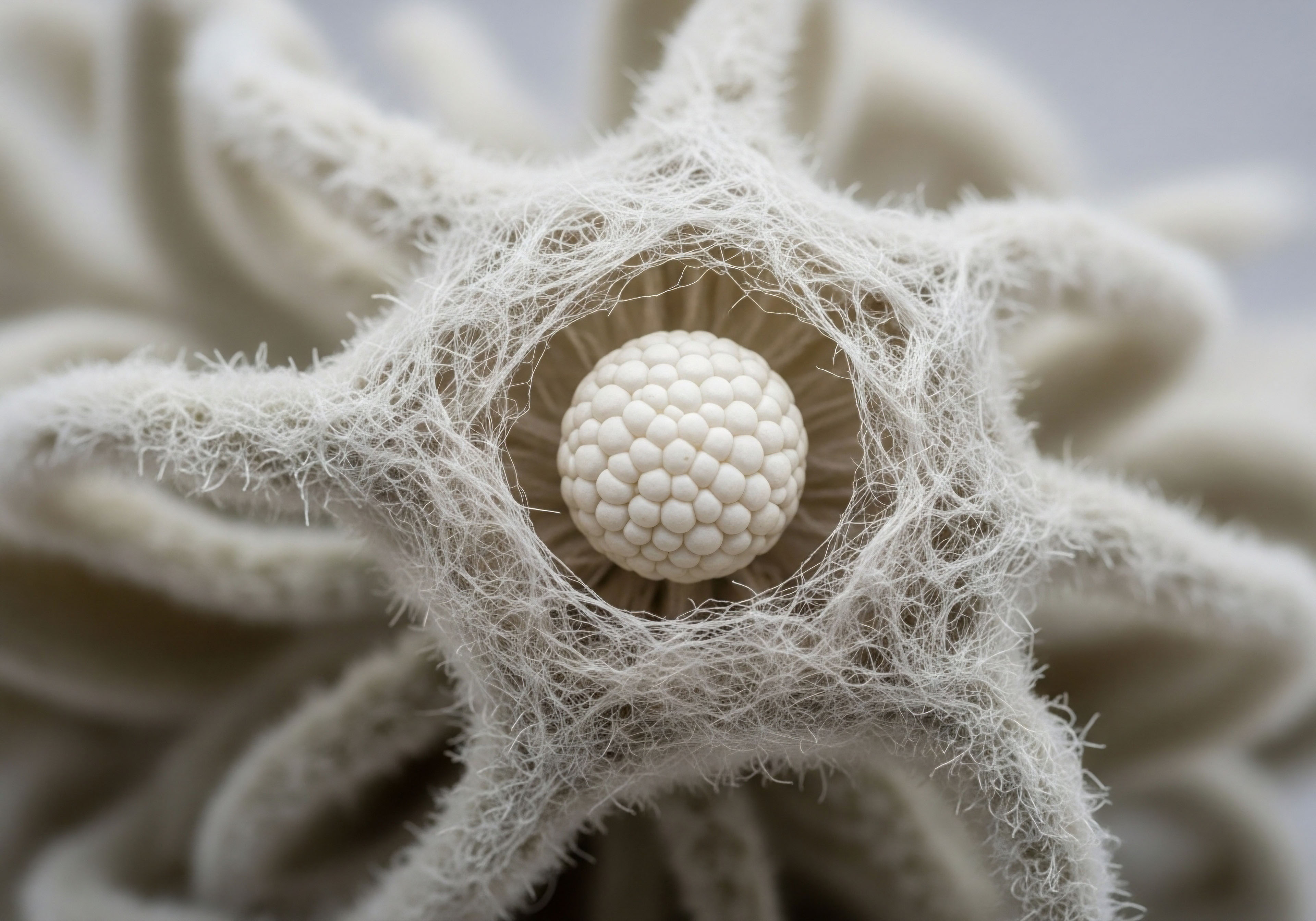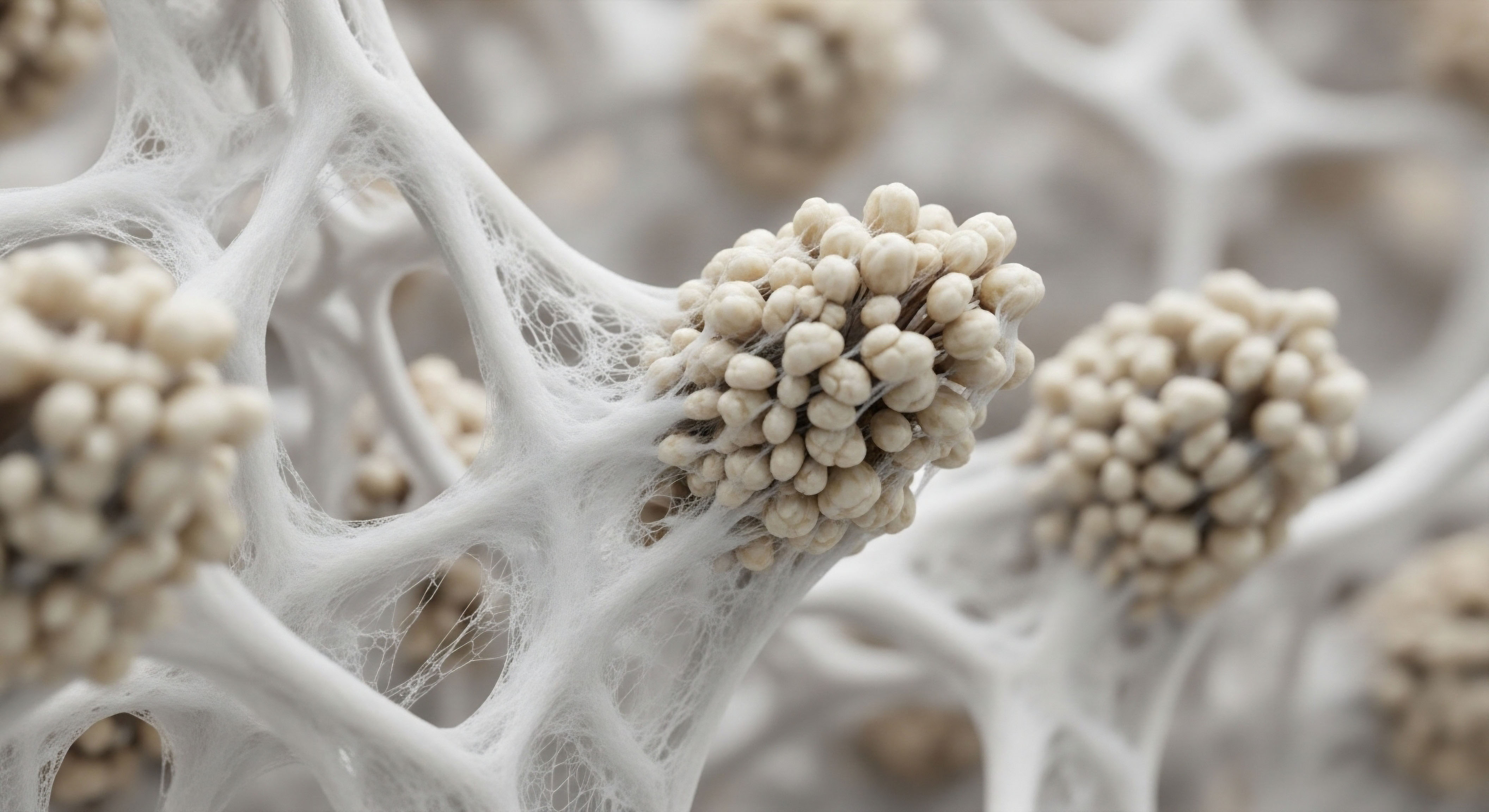

Reclaiming Your Vitality the Lifestyle Equation
A persistent sense of fatigue, a diminishing drive, or a subtle erosion of physical capacity often signals a deeper physiological shift within the human system. This experience, frequently dismissed as an inevitable consequence of aging, reflects a profound disequilibrium, particularly within the endocrine architecture.
Many individuals find themselves standing at a crossroads, contemplating Testosterone Replacement Therapy (TRT) as a means to restore fundamental hormonal balance. This medical intervention delivers exogenous testosterone, directly addressing a deficit in the body’s natural production. However, the true reclamation of vitality extends beyond merely supplementing a hormone; it necessitates a comprehensive engagement with the daily rhythms and intrinsic regulatory mechanisms that govern our overall well-being.
Optimal health emerges from a sophisticated interplay between targeted hormonal support and a meticulously orchestrated lifestyle.
Understanding your own biological systems represents a deeply personal journey toward sustained health. Testosterone, a potent steroid hormone, influences far more than just libido and muscle mass; it orchestrates mood regulation, cognitive clarity, bone density, and metabolic efficiency. When endogenous production falters, the cascade of symptoms experienced reflects a systemic impact.
Introducing external testosterone offers a direct pathway to alleviate these immediate concerns, yet the body’s capacity to effectively utilize and respond to this new hormonal input remains intrinsically tied to its broader physiological environment. This environment, shaped by daily choices, determines the ultimate efficacy and sustainability of any hormonal optimization protocol.

Understanding the Endocrine Orchestra
The human endocrine system operates as a complex, self-regulating orchestra, where each hormone acts as a distinct instrument, contributing to a harmonious physiological symphony. Testosterone, in this analogy, performs as a lead conductor for numerous metabolic and anabolic processes. When a conductor is absent or muted, the entire performance suffers.
Testosterone replacement therapy provides a new, external conductor. However, the quality of the orchestra’s performance ∞ its ability to respond to this new direction ∞ depends on the health and readiness of each individual instrument. Lifestyle adjustments, therefore, function as the essential tuning and conditioning for this intricate biological ensemble, preparing it to receive and amplify the therapeutic signals of TRT.
This perspective moves beyond a simplistic view of hormone therapy as a standalone solution. It positions TRT within a broader, integrated framework, recognizing that the body’s internal milieu dictates how effectively any external intervention can translate into tangible improvements in function and well-being. Individuals seeking to optimize their hormonal health discover that the most profound and lasting transformations arise from a deliberate, conscious effort to align their daily practices with their biological imperatives.


Optimizing Testosterone Outcomes a Deeper Dive
For those already familiar with the foundational role of testosterone, the next logical inquiry involves how to maximize the therapeutic benefit of Testosterone Replacement Therapy. The administration of exogenous testosterone, typically through weekly intramuscular injections of Testosterone Cypionate, serves as a direct intervention for hypogonadism.
This approach, while highly effective in elevating circulating testosterone levels, operates within a dynamic biological context. The body’s intricate feedback loops and metabolic pathways continually respond to both endogenous and exogenous hormonal signals. Consequently, the ultimate success of a hormonal optimization protocol extends beyond merely achieving target testosterone levels; it hinges on fostering an internal environment conducive to the hormone’s optimal action and mitigating potential adverse effects.
Integrating lifestyle modifications with TRT protocols creates a synergistic effect, enhancing therapeutic outcomes.

Synergistic Recalibration through Lifestyle
The deliberate incorporation of specific lifestyle adjustments profoundly influences how the body processes, utilizes, and responds to supplemental testosterone. Consider the interplay of nutrition, exercise, and sleep with the core TRT protocol, which often includes Gonadorelin and Anastrozole. Gonadorelin, administered subcutaneously, helps preserve testicular function and endogenous testosterone production, particularly important for maintaining fertility.
Anastrozole, an aromatase inhibitor, reduces the conversion of testosterone to estrogen, thereby managing potential estrogen-related side effects such as gynecomastia or water retention. Lifestyle choices can directly impact the efficacy of these adjunctive medications and the overall hormonal milieu.
For instance, dietary composition influences insulin sensitivity, a critical determinant of androgen receptor function. Regular physical activity enhances metabolic health, promoting favorable hormone receptor expression and improving body composition, which in turn affects aromatase activity. Furthermore, consistent, high-quality sleep regulates the pulsatile release of various hormones, including growth hormone and cortisol, which indirectly impact testosterone efficacy and recovery.

Nutritional Strategies for Endocrine Support
A precise nutritional strategy forms a bedrock for hormonal health, particularly when undergoing TRT. This approach involves more than calorie counting; it focuses on macronutrient balance and micronutrient density to support metabolic pathways.
- Protein Intake Adequate protein supports muscle protein synthesis, a primary benefit of optimized testosterone levels.
- Healthy Fats Essential fatty acids are precursors for steroid hormone synthesis and maintain cellular membrane integrity, crucial for receptor sensitivity.
- Complex Carbohydrates These provide sustained energy and help regulate blood glucose, preventing insulin spikes that can exacerbate inflammation and negatively impact hormonal balance.
- Micronutrient Richness Vitamins D and Zinc, among others, are vital cofactors in testosterone production and metabolism.
By supplying the necessary building blocks and regulatory signals, a thoughtful diet prepares the body to maximize the anabolic and metabolic advantages conferred by TRT.

Movement and Hormonal Responsiveness
Structured exercise acts as a potent modulator of endocrine function. Engaging in both resistance training and cardiovascular activity creates a favorable physiological environment for testosterone utilization.
| Exercise Type | Primary Hormonal Impact | TRT Complementary Effect |
|---|---|---|
| Resistance Training | Increases androgen receptor density, boosts growth hormone, improves insulin sensitivity. | Enhances muscle hypertrophy and strength gains from TRT. |
| High-Intensity Interval Training (HIIT) | Elevates growth hormone, improves mitochondrial function, reduces visceral fat. | Supports fat loss and metabolic efficiency, optimizing TRT’s body composition benefits. |
| Moderate Cardiovascular Exercise | Reduces systemic inflammation, improves endothelial function, aids stress reduction. | Supports overall cardiovascular health, mitigating potential TRT-related hematocrit increases. |
The disciplined application of exercise protocols amplifies the beneficial effects of TRT, translating into superior body composition, enhanced strength, and improved metabolic markers.

Can Stress Mitigation Improve TRT Efficacy?
Chronic psychological and physiological stress exerts a pervasive influence on the endocrine system, often creating a counter-regulatory environment to the desired effects of TRT. The hypothalamic-pituitary-adrenal (HPA) axis, the body’s central stress response system, directly interacts with the hypothalamic-pituitary-gonadal (HPG) axis. Elevated cortisol levels, a hallmark of chronic stress, can directly inhibit testosterone synthesis and reduce androgen receptor sensitivity.
Therefore, incorporating deliberate stress reduction techniques, such as mindfulness practices, adequate sleep hygiene, and intentional recovery periods, becomes an indispensable component of a holistic TRT protocol. By attenuating the physiological burden of stress, individuals create a more receptive internal landscape, allowing the administered testosterone to exert its full therapeutic potential and fostering a more robust sense of well-being.


Endocrine Crosstalk and Epigenetic Modulation in TRT Outcomes
The sophisticated interplay between exogenous testosterone administration and intrinsic physiological regulation represents a compelling area of advanced clinical inquiry. While Testosterone Replacement Therapy directly addresses androgenic insufficiency, its long-term efficacy and the nuanced quality of patient outcomes are inextricably linked to the intricate crosstalk within the broader endocrine network and the epigenetic modifications influenced by lifestyle.
This perspective transcends a mere supplementation model, viewing TRT as a targeted input into a highly adaptive, self-organizing biological system. The ultimate goal involves orchestrating a state of systemic recalibration, where the benefits of exogenous testosterone are amplified and sustained through endogenous regulatory optimization.
From an academic standpoint, understanding the molecular mechanisms by which lifestyle influences TRT outcomes requires a deep appreciation of systems biology. This involves examining the intricate feedback loops, receptor dynamics, and enzymatic pathways that govern steroidogenesis, metabolism, and cellular responsiveness.

The Hypothalamic-Pituitary-Gonadal Axis and Metabolic Intersections
The HPG axis, a central regulator of reproductive and endocrine function, remains a focal point even with exogenous testosterone. While supraphysiological doses of external testosterone can suppress endogenous luteinizing hormone (LH) and follicle-stimulating hormone (FSH) secretion, leading to testicular atrophy and impaired spermatogenesis, co-administration of agents like Gonadorelin or Enclomiphene aims to mitigate this suppression.
Gonadorelin, a GnRH analog, stimulates pituitary LH and FSH release, maintaining testicular activity. Enclomiphene, a selective estrogen receptor modulator (SERM), blocks estrogen feedback at the hypothalamus and pituitary, thereby increasing endogenous gonadotropin secretion.
Crucially, lifestyle factors significantly influence the sensitivity of the HPG axis and its peripheral targets. Chronic hyperinsulinemia, often a consequence of poor dietary choices, can directly impair Leydig cell function and reduce androgen receptor sensitivity.
Conversely, regular physical activity and a diet rich in fermentable fibers can enhance insulin sensitivity and modulate the gut microbiome, which in turn influences the enterohepatic circulation of steroid hormones and their metabolites. This demonstrates a complex metabolic intersection, where the effectiveness of TRT is not solely determined by circulating testosterone levels but by the cellular environment’s capacity to perceive and respond to these signals.
Epigenetic modifications, influenced by lifestyle, profoundly impact gene expression related to hormonal responsiveness.

Androgen Receptor Dynamics and Epigenetic Regulation
The biological action of testosterone is mediated through its binding to the androgen receptor (AR), a ligand-activated transcription factor. The expression, localization, and sensitivity of the AR are subject to sophisticated regulatory mechanisms, including epigenetic modifications. These modifications, such as DNA methylation and histone acetylation, alter gene expression without changing the underlying DNA sequence.
- DNA Methylation Hypermethylation of the AR promoter region can decrease AR expression, thereby reducing cellular responsiveness to testosterone.
- Histone Acetylation Histone deacetylases (HDACs) remove acetyl groups from histones, leading to chromatin condensation and gene silencing.
- MicroRNAs Small non-coding RNAs can regulate AR expression post-transcriptionally, influencing protein synthesis.
Lifestyle interventions, particularly specific dietary components and exercise regimens, have been shown to influence these epigenetic marks. For instance, compounds like sulforaphane from cruciferous vegetables can act as HDAC inhibitors, potentially increasing AR expression. Similarly, regular exercise can induce epigenetic changes in muscle cells, enhancing their anabolic responsiveness.
This suggests that lifestyle adjustments do not merely provide supportive conditions; they actively reprogram cellular machinery to optimize the reception and transduction of testosterone signals, offering a profound layer of complementarity to TRT.
| Lifestyle Factor | Molecular Mechanism | Clinical Relevance to TRT |
|---|---|---|
| Caloric Restriction/Time-Restricted Feeding | Activates sirtuins (SIRT1), improves mitochondrial biogenesis, enhances insulin sensitivity. | Optimizes metabolic environment for androgen action, potentially reducing estrogen conversion. |
| Resistance Training | Increases AR density in muscle, activates mTOR pathway, induces myogenesis. | Maximizes anabolic response to TRT, promoting lean muscle mass accretion. |
| Omega-3 Fatty Acids | Modulates inflammation (resolvins, protectins), influences cell membrane fluidity. | Reduces systemic inflammation, potentially improving AR signaling and overall health. |
| Sleep Optimization | Regulates growth hormone pulsatility, cortisol rhythm, leptin/ghrelin balance. | Supports anabolic processes, reduces catabolic stress, enhancing TRT’s restorative effects. |

Neurotransmitter Function and Psychological Well-Being
The impact of testosterone extends to central nervous system function, influencing neurotransmitter systems and psychological states. Low testosterone is frequently associated with symptoms of depression, anxiety, and cognitive decline. While TRT often alleviates these symptoms, the integration of lifestyle practices provides a robust framework for optimizing neuroendocrine balance. Physical activity stimulates neurogenesis and increases the production of neurotrophic factors, such as BDNF. Dietary patterns rich in prebiotics and probiotics can modulate the gut-brain axis, influencing neurotransmitter synthesis and mood.
Moreover, the strategic application of specific peptides, such as Sermorelin or Ipamorelin / CJC-1295, can further enhance this neuroendocrine synergy. These growth hormone-releasing peptides stimulate the pituitary to secrete endogenous growth hormone, which plays a vital role in tissue repair, metabolic regulation, and cognitive function.
Tesamorelin, a GHRH analog, specifically reduces visceral adipose tissue, further improving metabolic health. Hexarelin, another growth hormone secretagogue, also influences cardiovascular function. The synergistic application of these peptides alongside TRT, supported by lifestyle, offers a comprehensive approach to reclaiming not only physical vitality but also cognitive sharpness and emotional resilience. This holistic integration represents the zenith of personalized wellness protocols, moving beyond symptomatic relief to foster a state of true physiological flourishing.

References
- Travison, T. G. et al. “Changes in Testosterone Concentrations and Other Hormones in Middle-Aged Men ∞ Longitudinal Results from the Massachusetts Male Aging Study.” Clinical Endocrinology, vol. 67, no. 6, 2007, pp. 859-867.
- Boron, W. F. & Boulpaep, E. L. Medical Physiology. 3rd ed. Elsevier, 2017.
- Vingren, J. L. et al. “Testosterone Physiology in Resistance Exercise and Training ∞ The Androgen Receptor and the Anabolic Window.” Sports Medicine, vol. 40, no. 12, 2010, pp. 1037-1050.
- Krzysztofik, M. et al. “The Impact of Resistance Training on Testosterone Levels in Healthy Men ∞ A Systematic Review.” Journal of Human Kinetics, vol. 72, 2020, pp. 103-114.
- Kelly, D. M. & Jones, T. H. “Testosterone and Obesity.” Obesity Reviews, vol. 13, no. 9, 2012, pp. 783-792.
- Morgan, C. A. et al. “Exercise, Stress, and the HPA Axis ∞ A Review.” Sports Medicine, vol. 45, no. 10, 2015, pp. 1461-1476.
- Groves, J. T. Principles of Medicinal Chemistry. 8th ed. Lippincott Williams & Wilkins, 2016.
- Guyton, A. C. & Hall, J. E. Textbook of Medical Physiology. 13th ed. Elsevier, 2016.
- Handelsman, D. J. & Conway, A. J. “Testosterone Physiology and Pharmacokinetics.” Clinical Endocrinology, vol. 81, no. 1, 2014, pp. 1-14.
- Sattler, F. R. et al. “Testosterone and Growth Hormone in Older Men.” Journal of Clinical Endocrinology & Metabolism, vol. 99, no. 1, 2014, pp. 1-10.

Reflection
The insights presented herein serve as a compass, guiding you toward a deeper understanding of your own biological landscape. This knowledge, a profound illumination of the intricate connections within your physiology, represents merely the initial stride. True, enduring vitality emerges not from passive reception of information, but from the deliberate, personalized application of these principles.
Consider this a call to introspection ∞ how might your unique daily rhythms and choices harmonize with the science of hormonal optimization? Your personal journey toward reclaimed function and unwavering well-being awaits a conscious, empowered step forward, recognizing that the most potent solutions are those crafted with an intimate understanding of your individual system.



